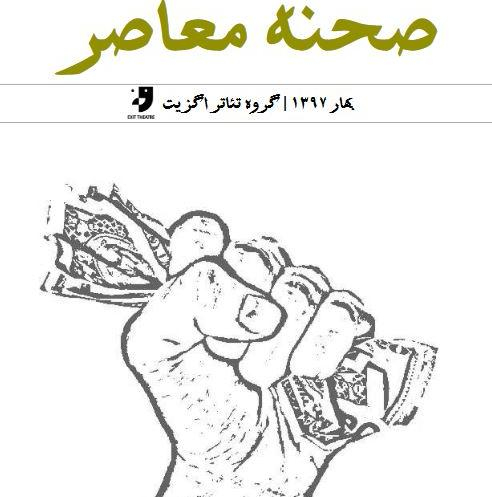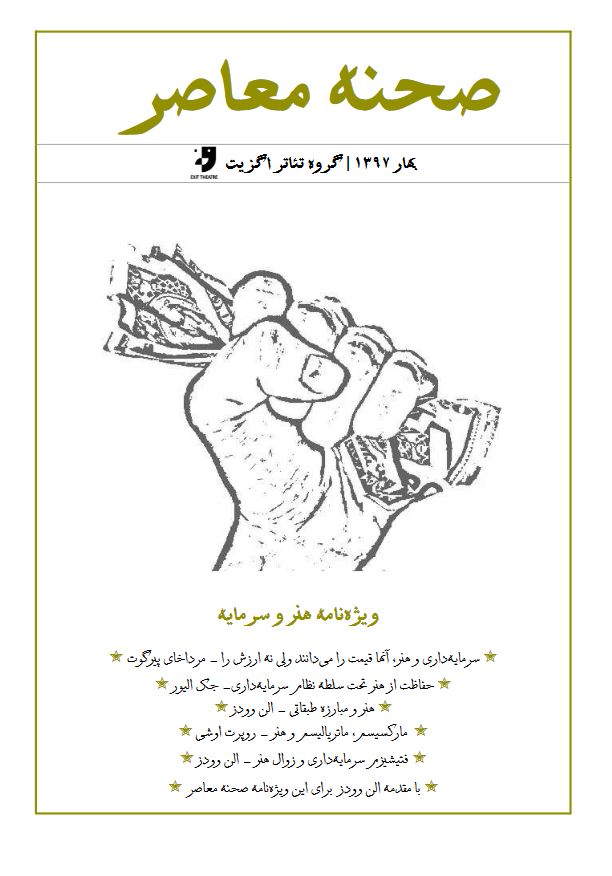We publish Alan Woods’ guest introduction to a special edition of Farsi-language art magazine, Contemporary Scene, called Capitalism and Art. The edition contains a series of articles about Marxism and culture, many of which were previously published on Marxist.com. Read the full edition in Farsi here.
I have been asked by the Iranian magazine Contemporary Scene to contribute an article to a special issue on the subject ‘Capitalism and art’. I have only recently become acquainted with this publication, which is a theoretical journal related to art and stage art in particular. I believe the growing interest in Marxist ideas among young people, artists and intellectuals in Iran to be an extremely significant development and am delighted to be able to contribute to this important discussion.
The English poet Robert Graves was once told by a businessman; “There’s no money in poetry” to which he replied: “No, but there’s no poetry in money.” It is my firm conviction that capitalism, especially in its period of senile decay, is profoundly inimical to art. The capitalists see art as they see everything else: as a commodity. They know the price of a work of art, but not the value. For them, art is and artists are to be bought and sold like any other commodity.
When the great Dutch artist Vermeer died his wife had to sell the few paintings he had left to the baker to pay the bills. Similarly, Van Gogh sold only a single painting in his entire life. Now great paintings (and even not-so-great ones) are sold for vast sums in the auction rooms of London and New York. Art in the modern world is merely an object of speculation – a highly profitable and secure field of investment.
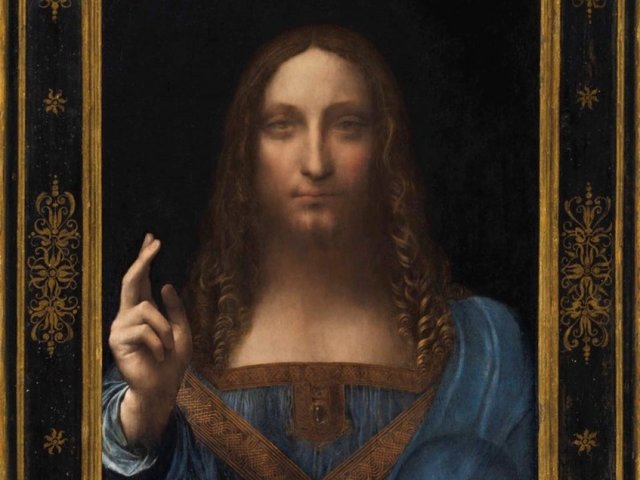 Leonardo da Vinci's 'Saviour of the World' was bought for $450 million (£342 million) in New York / Image: public domain
Leonardo da Vinci's 'Saviour of the World' was bought for $450 million (£342 million) in New York / Image: public domain
In the past some wealthy men, such as the Medici family in Florence, were generous patrons of the arts. True, they had more money than they knew what to do with, but some of them at least had some interest in art and showed a degree of appreciation for the works they commissioned. But today, the anonymous figures who bid over the phone, offering countless millions of dollars for a painting by Picasso do not do so out of any love for art.
Most of the paintings thus acquired will never be seen by the public, maybe not even by the buyer himself. They will be buried in the vault of some Swiss bank – as lost to humanity as any of the wonderful ancient works of art that have been dynamited or bulldozed by the barbarians of Daesh in Syria and Iraq. We might add that not all of these artefacts were physically destroyed. Many were carefully removed, smuggled out of the country and secretly sold to wealthy American ‘art lovers’ who are holding them prisoners, like the poor devils in the underground prisons of Daesh. The real barbarians and destroyers of art are to be found in New York and London.
Literature and revolution
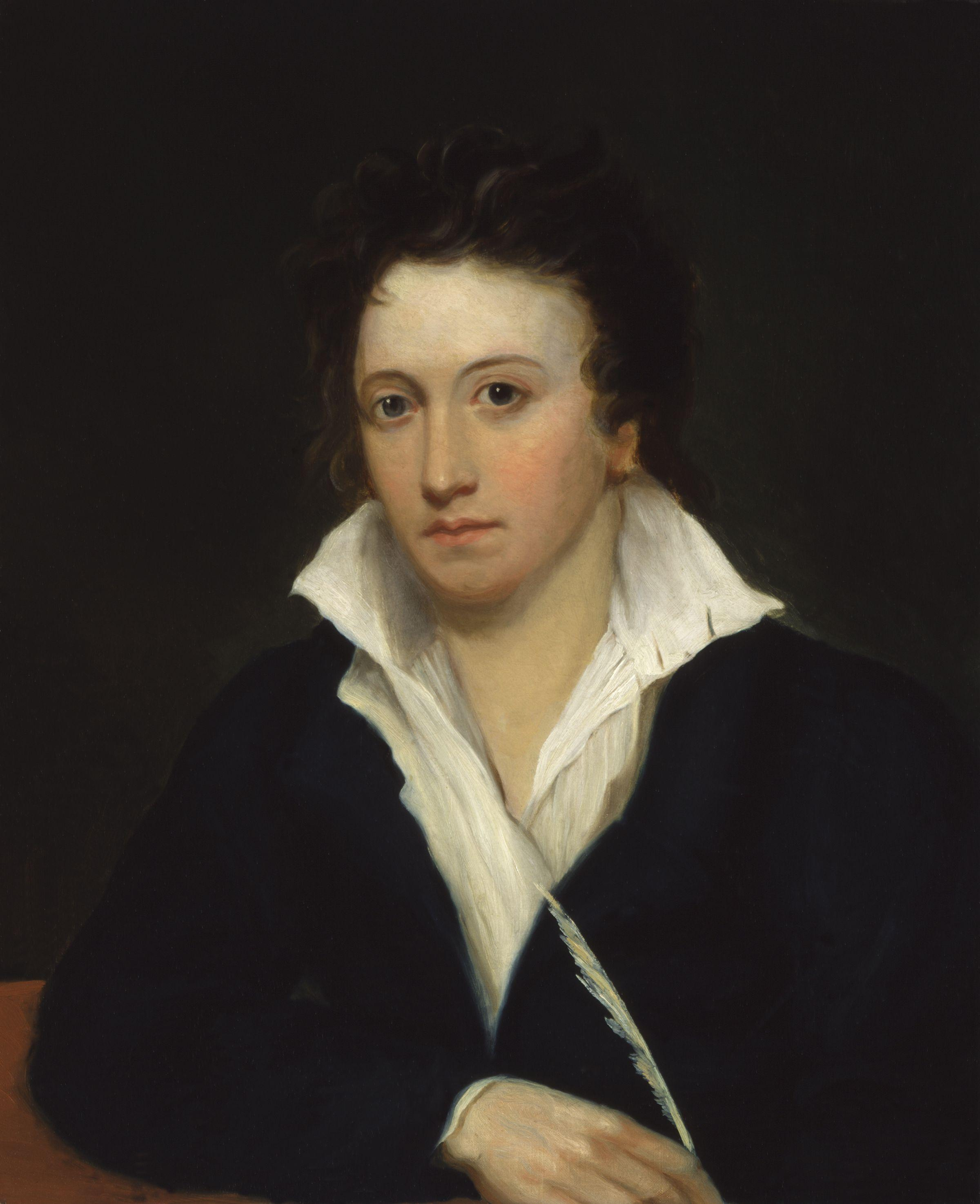 The revolutionary poetry of Percy Bysshe Shelley retains all its power today / Image: public domain
The revolutionary poetry of Percy Bysshe Shelley retains all its power today / Image: public domain
Historically speaking, literature and poetry have often been the vehicles for the most advanced and revolutionary ideas. Marx was a great admirer of Percy Shelley, the great revolutionary English poet who died tragically young. Among his works we find revolutionary masterpieces like The Revolt of Islam and The Masque of Anarchy. The second of these works is an angry condemnation of a massacre of unarmed men women and children perpetrated by the reactionary government.
On the 16 August 1819 in St Peter's Square, Manchester, 60,000 peaceful protesters gathered to demand liberty and freedom from poverty. They were brutally attacked by cavalry in an event which became known as the Peterloo Massacre. That day an estimated 18 people, including four women and a child, died from sabre cuts and trampling. Nearly seven hundred men, women and children were seriously wounded.
The Tory government was ultimately responsible for the massacre and Viscount Castlereagh, leader of the Tories in the Commons, was a spokesman for the harsh measures of political repression that followed it. Shelley wrote The Masque of Anarchy as an impassioned protest against this massacre. It is a powerful indictment of the government and the forces of reaction. In it we read the following:
I met Murder on the way -
He had a mask like Castlereagh -
Very smooth he looked, yet grim;
Seven blood-hounds followed him:
All were fat; and well they might
Be in admirable plight,
For one by one, and two by two,
He tossed the human hearts to chew
Which from his wide cloak he drew.
Next came Fraud, and he had on,
Like Eldon, an ermined gown;
His big tears, for he wept well,
Turned to mill-stones as they fell.
And the little children, who
Round his feet played to and fro,
Thinking every tear a gem,
Had their brains knocked out by them.
Today, over 200 years after these lines were written, they have lost none of their power to shock and inspire revolutionary indignation. It is no accident that a few months ago the left-wing leader of the British Labour Party, Jeremy Corbyn, quoted the final two stanzas of this great poem to an ecstatic audience of young people at the Glastonbury pop festival:
Men of England, heirs of Glory,
Heroes of unwritten story,
Nurslings of one mighty Mother,
Hopes of her, and one another;
Rise like Lions after slumber
In unvanquishable number,
Shake your chains to earth like dew
Which in sleep had fallen on you -
Ye are many - they are few.
The thousands of young people who listened to these inspiring verses were overjoyed by their revolutionary spirit. They had come to the festival to listen to pop music but went away fired by revolutionary enthusiasm. Here we see clearly the power of poetry to produce fire in the hearts of men and women. It is a power that does not diminish with the passing of time but if anything grows stronger.
Wordsworth and the French Revolution
Some years before Shelley wrote these lines, the celebrated English poet William Wordsworth composed his great poem The Prelude. At that time, together with many writers and poets in England, Wordsworth was under the spell of the Great French Revolution. He visited revolutionary France as a young man and wrote the following inspired verses to celebrate his experience:
Bliss was it in that dawn to be alive,
But to be young was very heaven!--Oh! times,
In which the meagre, stale, forbidding ways
Of custom, law, and statute, took at once
The attraction of a country in romance!
In later life Wordsworth became disenchanted with the French Revolution, following the rise of Napoleon Bonaparte. Many other intellectuals followed in his footsteps and even became reactionary conservatives. But one man stands out in striking contrast to this trend: the great Scottish poet Robert Burns. Unlike the other poets and writers of those times, Burns did not come from a wealthy, aristocratic or even middle-class background. The son of a poor small farmer he knew the world of poverty and hard work. Through his own native genius he rose through the ranks of the most outstanding poets of his age, or of any age.
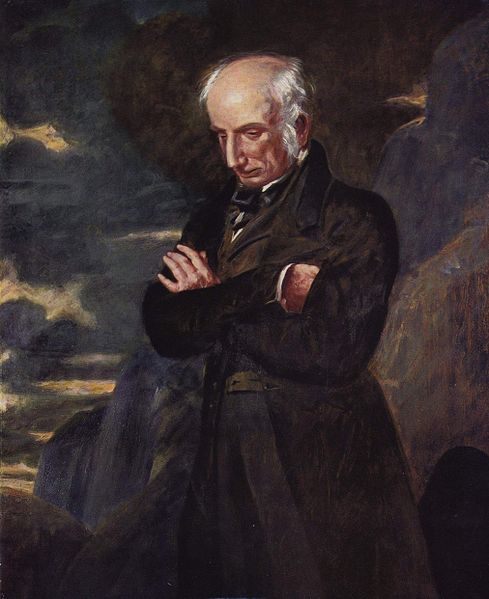 William Wordsworth was inspired by the French Revolution / Image: public domain
William Wordsworth was inspired by the French Revolution / Image: public domain
Apart from being a marvellous lyrical poet, Burns was also a courageous and consistent revolutionary democrat. In his works we frequently find the most biting and hostile references to the objects of his hate: landlords, kings, priests and lawyers. In his long satirical poem Tam o’Shanter, for example, we read:
Three lawyers' tongues, turn'd inside out,
Wi' lies seam'd like a beggar's clout;
Three priests' hearts, rotten, black as muck,
Lay stinking, vile in every neuk.
These lines are written in Burns’s native Lowland Scots dialect. In modern English it would read as follows:
Three Lawyers’ tongues, turned inside out,
Sown with lies like a beggar’s cloth -
Three Priests’ hearts, rotten, black as muck
Lay stinking, vile, in every nook.
In his brief but bitingly mocking poem “Thanksgiving For A National Victory”, Burns shows his complete contempt for the patriotic fever that gripped the whole of Britain during the long wars against revolutionary France:
Ye hypocrites! are these your pranks?
To murder men and give God thanks!
Desist, for shame!-proceed no further;
God won't accept your thanks for Murther!
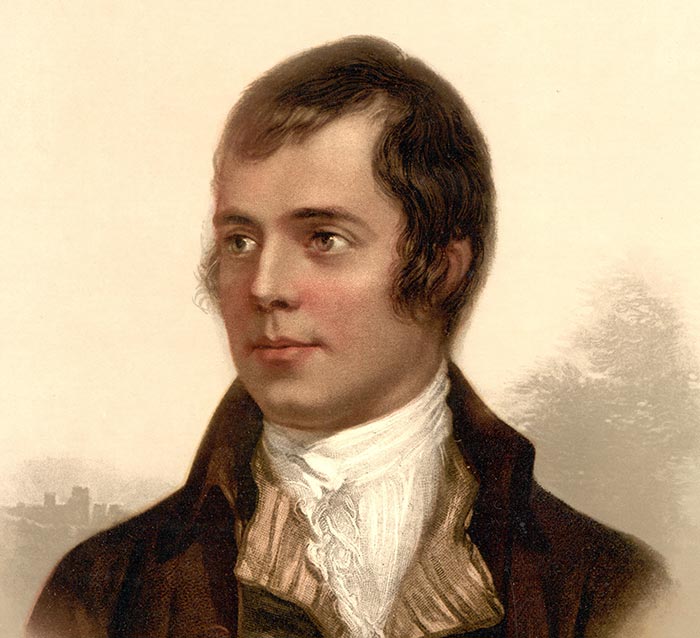 Unlike Wordsworth, Robert Burns never lost his passion for the French Revolution / Image: public domain
Unlike Wordsworth, Robert Burns never lost his passion for the French Revolution / Image: public domain
Robert Burns retained his burning faith in the French Revolution to the end of his days and was outspoken in its defence. Only the support of his aristocratic admirers saved him from imprisonment or worse. Nevertheless, the government took its revenge by denying him a comfortable office in the civil service. He ended his days, as his father had done, working on the land in harsh conditions that undermined his fragile health and killed him in the end.
Revolutionary drama
In drama, poetry and prose find a new dimension and meaning. The relationship between the poet and the individual reader is the relationship between two essentially unrelated atoms. Drama brings new life to the written word, which at last escapes from the narrow confines of written literature and jumps off the page to confront a larger audience in a far more concrete and more immediate way.
This provides literature with a far greater scope than would ever be possible in a written form. It contains greater power to shock, to move or to amuse. Its main genres were traditionally tragedy and comedy, although a genius like Shakespeare was able to combine the two with great effect. The potential to use the theatre for political and revolutionary purposes is therefore very clear.
Even in its most ancient form drama has been used to convey a certain message. In Greek tragedy we find a powerful anti-war message in The Trojan women by the Greek playwright Euripides. Produced in 415 BC during the Peloponnesian War, it is often interpreted as a commentary on the capture of the Aegean island of Melos and the subsequent slaughter and enslavement of its population by Athens. If this interpretation is correct, it was a very courageous and audacious political statement indeed. It shows the subjugation and cruelty towards the captured women in its crudest and most shocking way. Like all great drama it has lost none of its power to shock more than 2000 years later.
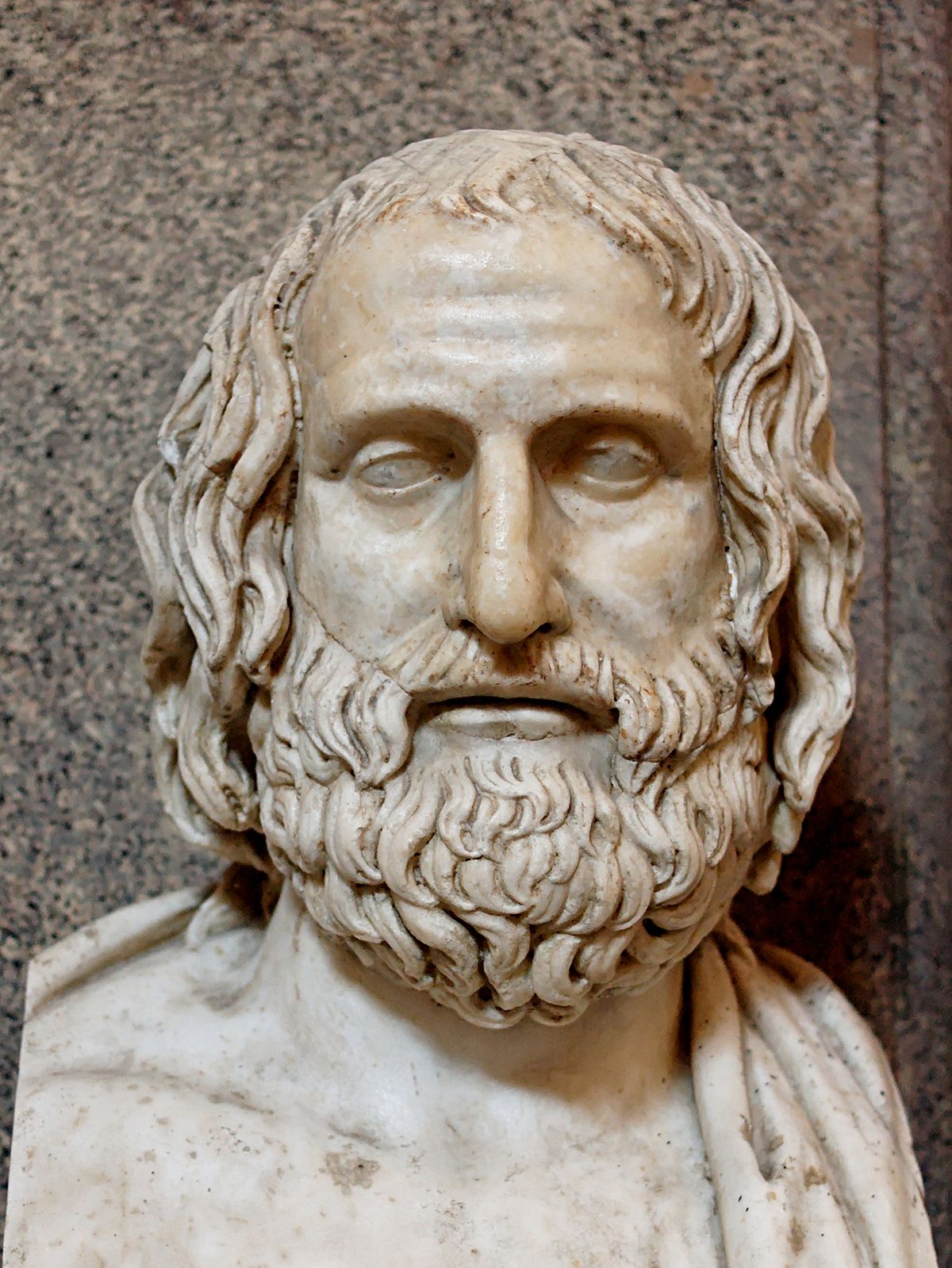 'The Trojan Women' by the Greek playwright Euripides is an ancient, powerful anti-war piece / Image: public domain
'The Trojan Women' by the Greek playwright Euripides is an ancient, powerful anti-war piece / Image: public domain
On another entirely different level the comedies of Aristophanes had an equally sharp political message. The plays that have come down to us contain a biting criticism of contemporary Athenian society, its customs, its politics and even its philosophy. The most definite political message in Aristophanes relates to the bloody and prolonged wars between Athens and Sparta. Four of his plays are passionate appeals for peace.
Unlike the plays of Euripides, however, in Aristophanes we find no lofty principles or morality. Politically Aristophanes was a conservative and a bitter enemy of Athenian democracy, which he considered to be the source of all evil. His plays contain many scathing attacks on the people of Athens who he considered to be mere dupes in the hands of unscrupulous demagogues. Probably his desire for peace with Sparta indicates a certain sympathy towards the conservative and draconic political system in that state. In any case, in the works of Aristophanes, the art of comedy reaches similar heights to those attained by his rivals, the great tragedians of the Athenian stage.
Shakespeare and Ibsen
With the works of Shakespeare, the dramatic art reaches a truly sublime level that has never since been equalled, still less surpassed. Here poetry and drama become fused into a single art form. Every line in these great dramas is poetry of the very highest order. This does not in any way lessen the dramatic impact of the plays. Quite the contrary, the dramatic impact is rendered even more powerful by the impact of the poetic imagery.
This is not the place to develop an analysis of Shakespeare’s work (I have attempted to do this elsewhere). I am certainly not alone in my unshakeable conviction that Shakespeare was the greatest writer of all time. But since the main emphasis of the present article concerns the relationship between politics (and specifically revolutionary politics) and literature, I must point out that such a relationship, although it can be detected in some of Shakespeare’s works, is very far from being of major importance.
One can draw certain conclusions about Shakespeare’s attitude to revolution from certain passages in Henry VI Part 2 and Julius Caesar, for example, but such a conclusion would have to be of a distinctly negative character. Memories of the bloody civil wars known as the Wars of the Roses were still very much present in people’s minds in Shakespeare’s day, and people of his social class were not favourably disposed towards a return to social and political upheavals. Shakespeare’s outlook in that sense was conservative, although in the field of art and literature he was a very great revolutionary and an audacious innovator.
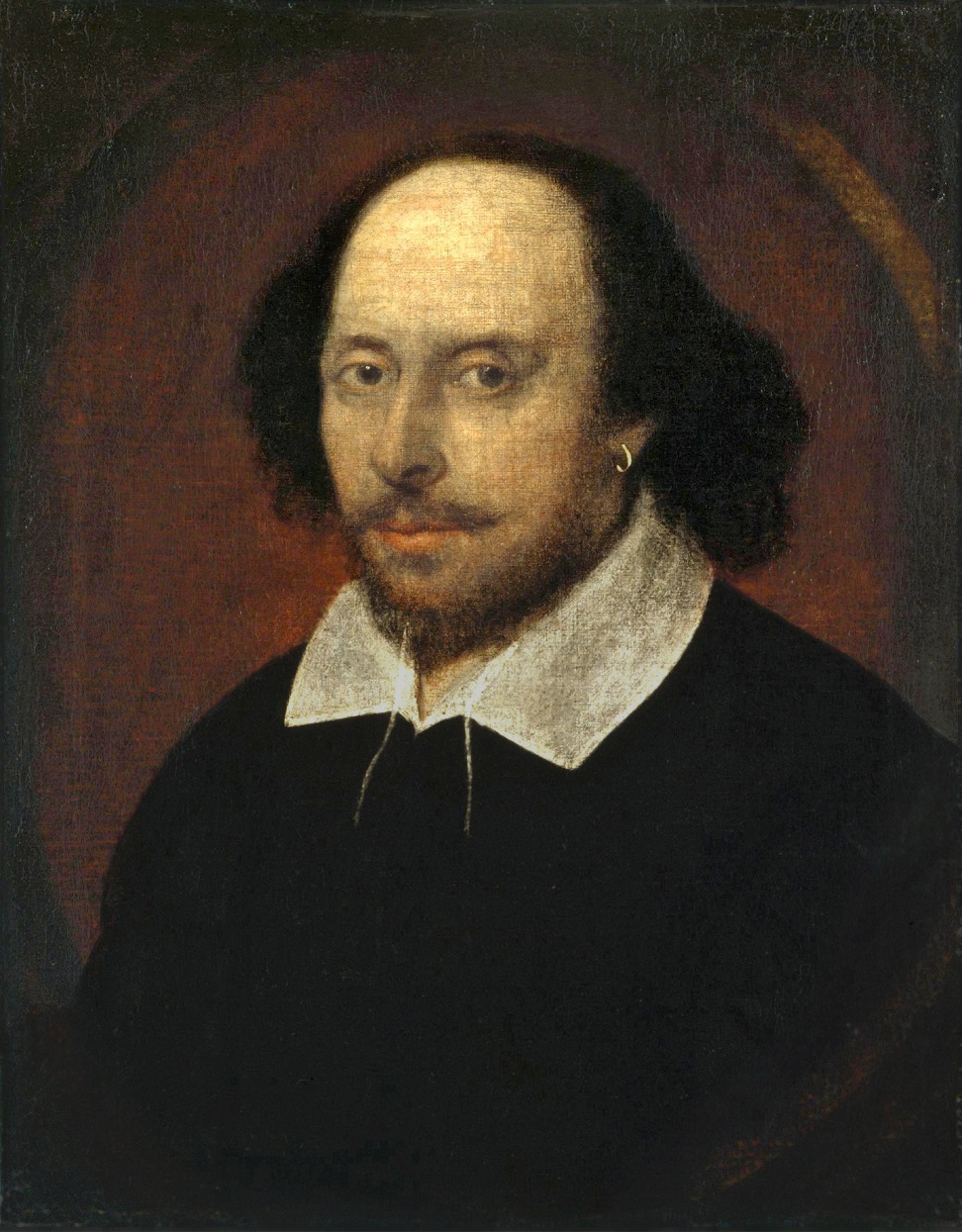 Shakespeare was a revolutionary in the field of art, although some of his political views were conservative / Image: public domain
Shakespeare was a revolutionary in the field of art, although some of his political views were conservative / Image: public domain
In the 19th century we have the works of the great Norwegian dramatist Henrik Ibsen. These dramas can shed a great deal of light on the nature and problems of Norwegian society of that period, and particularly the narrow philistinism and hypocritical morality of the Norwegian middle-class. Ibsen subjects this to a scathing and penetrating criticism in his plays.
These plays shocked and scandalised Europe at the time. Ibsen embraces the theme of the emancipation of women in plays as A Doll's House. Here a woman finally escapes from the suffocating confines of an unhappy marriage. The sound of the door she slams behind her is a powerful symbol of the prison she leaves behind. It is a devastating condemnation of the hypocritical 19th century values that tried to disguise the slavery of women to men as the natural, unalterable God-given state of affairs.
In An Enemy of the People the central character Doctor Stockman discovers that the baths' drainage system is contaminated. He alerts several members of the community and at first receives support and thanks for making his discovery. The next morning, however, his brother, who is also the town's mayor, tells him that he must retract his statements, as the repairs would be too expensive and in any case the mayor is not convinced by the findings.
The mayor mobilises public opinion against his brother and one by one his erstwhile supporters abandon him. Because he refuses to renounce his ideas he is ostracised by the respectable middle-class community. His home is vandalised and he is sacked, together with his daughters. He has become an Enemy of the People.
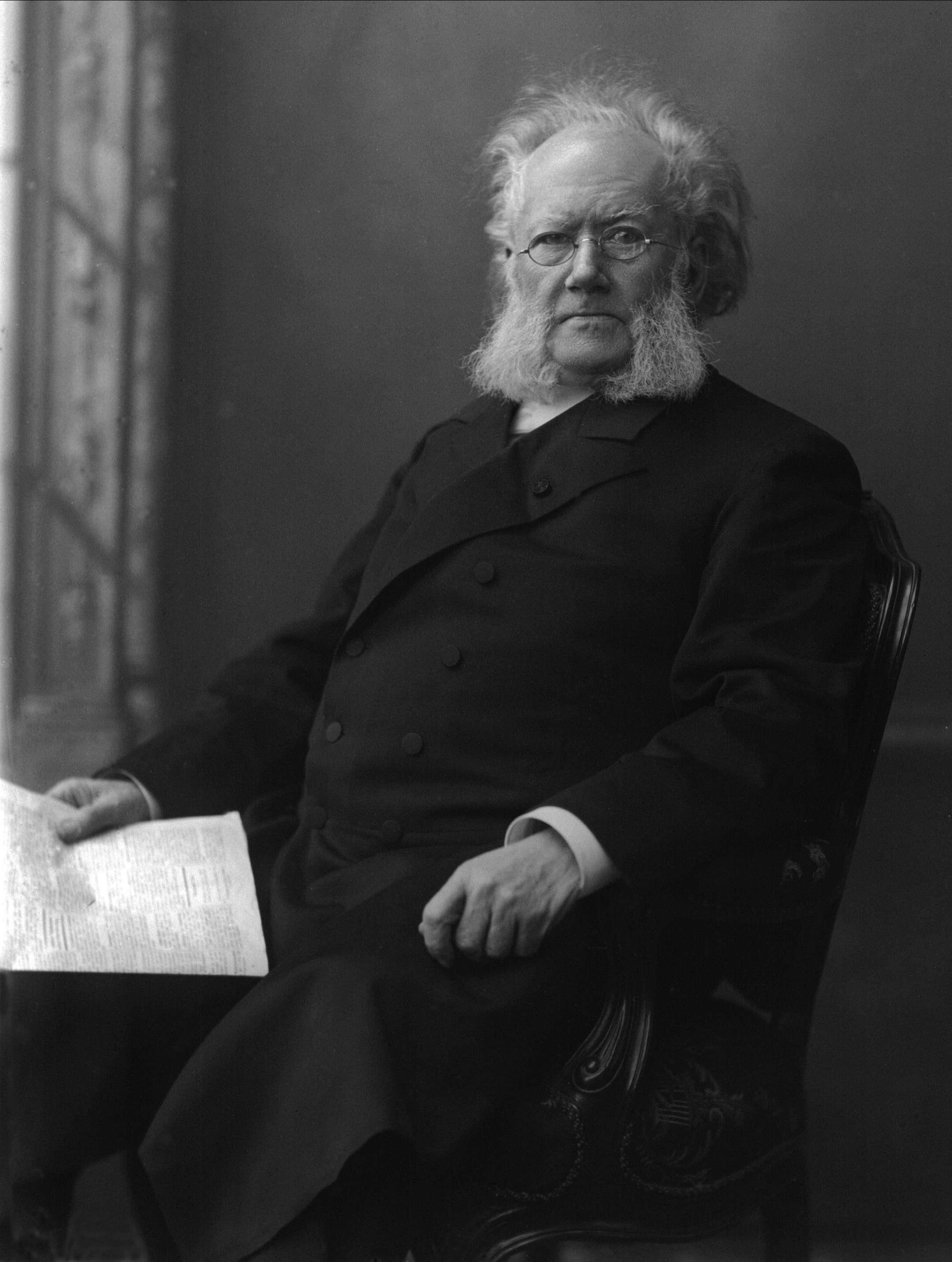 Henrik Ibsen's plays skewered many of the problems of 19th century Norwegian society / Image: public domain
Henrik Ibsen's plays skewered many of the problems of 19th century Norwegian society / Image: public domain
Many years later, when the great Russian revolutionary Leon Trotsky was living in enforced exile in Norway, he meditated on the meaning of Ibsen’s great dramas. Having been welcomed to ‘democratic’ Norway by the Labour Party that was in government, Trotsky soon found himself in far worse conditions than he had previously been in France. Cut off from the outside world, forbidden to write or even comment on external affairs at a time when Stalin was launching the monstrous Moscow Trials, he was virtually under house arrest.
Trotsky was struck by the profound and truthful way in which the great Norwegian dramatist of the 19th century so eloquently denounced the hypocrisy that is so characteristic of the Scandinavian petty bourgeoisie in general and the ‘progressive’ and ‘liberal’ (nowadays one would say Social Democratic) petty bourgeoisie in particular. Behind the smiling mask of liberalism, we always find the ugly face of bourgeois reaction. Anyone who dares to tear away this mask is automatically denounced as an Enemy of the People.
Political art
The German writer Bertolt Brecht once observed: “For art to become ‘unpolitical’ means only to ally itself with the ‘ruling group’”. Of course, it is possible for art to avoid social comment altogether, to bury itself in a bed of sweet smelling flowers, closing its eyes to the ugly reality of oppression and exploitation that surrounds it. But art that is true to itself, above all, great art, cannot be indifferent to the fate of humankind.
That is not to say that art must descend to the level of crude propaganda. Propaganda belongs to the field of politics where it plays an important role. But politics is not the natural field of art. The artist must express the feelings of the heart and soul. These feelings cannot be dictated by external influences, whether political, religious or monetary. However, at its highest level, artistic feeling can reflect the drama of human existence in a most powerful way.
In order that art may become genuinely free, in order that culture may cease to be the private property of a few and become genuinely human, it is first necessary to shatter the bonds of slavery, exploitation and oppression. That is why art, if it is to be true to itself, must be revolutionary art. And as we have seen in the case of Picasso, revolutionary art can attain the level of genius.
In the field of literature and drama, we can cite examples of writers who successfully combined revolutionary work with great artistic achievements. Mayakovsky was an active member of the Bolshevik party in Russia from a young age. In his poetry we can see a perfect fusion of revolutionary fervour with the highest possible poetic levels of achievement. He also wrote successful plays like The Bedbug and produced posters in the constructivists style that carried this branch of art to the highest level attained at any time either before or since.
It is no accident that Mayakovsky’s poetry exercised a powerful impact on the minds of millions of ordinary Russian workers and peasants in the years following the October Revolution. That great act of emancipation inspired the masses to participate not only in politics but in culture. The tremendous flowering of art, poetry and music in the 1920s was suffocated under the leaden rump of Stalinist bureaucracy. The suicide of Mayakovsky in 1930 was without doubt a protest against the Stalinist political counterrevolution.
Another striking example was the case of Bertolt Brecht. Like Mayakovsky, Brecht was a convinced Marxist who used his plays to mercilessly denounce capitalism. In plays like The Threepenny Opera, Rise and Fall of the city of Mahagonny and The Seven Deadly Sins (brilliantly set to music by Brecht’s talented collaborator Kurt Weill) he castigated bourgeois society, its morality and hypocrisy. Brecht is best known for his experimental plays and his revolutionary dramatic theory. But he was also an important poet who wrote 1,500 poems. Among these we find the powerful Questions of a Reading Worker, which is worth reproducing in full:
Who built Thebes of the seven gates?
In the books you will find the name of kings.
Did the kings haul up the lumps of rock?
And Babylon, many times demolished.
Who raised it up so many times? In what houses
Of gold-glittering Lima did the builders live?
Where, the evening that the Wall of China was finished
Did the masons go? Great Rome
Is full of triumphal arches. Who erected them? Over whom
Did the Caesars triumph? Had Byzantium, much praised in song,
Only palaces for its inhabitants? Even in fabled Atlantis
The night the ocean engulfed it
The drowning still bawled for their slaves.
The young Alexander conquered India.
Was he alone?
Caesar beat the Gauls.
Did he not have even a cook with him?
Philip of Spain wept when his armada
Went down. Was he the only one to weep?
Frederick the Second won the Seven Years' War. Who
Else won it?
Every page a victory.
Who cooked the feast for the victors?
Every ten years a great man.
Who paid the bill?
So many reports.
So many questions.
However, it is undoubtedly his dramatic works for which Brecht is best remembered. He developed an entirely new theory of drama known as the alienation effect (in German Verfremdungseffekt), which represents an unusual way of using the theatre. He described it as “playing in such a way that the audience was hindered from simply identifying itself with the characters in the play. Acceptance or rejection of their actions and utterances was meant to take place on a conscious plane, instead of, as hitherto, in the audience's subconscious.”
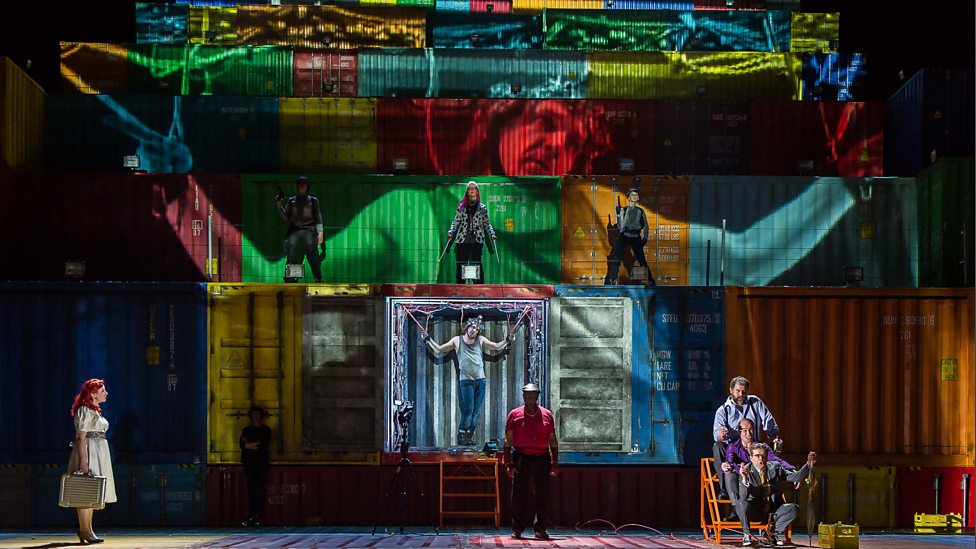 The uncompromising message of Brecht and Weill's 'Rise and Fall of the City of Mahagonny' caused uproar amongst middle-class audiences / Image: ROH
The uncompromising message of Brecht and Weill's 'Rise and Fall of the City of Mahagonny' caused uproar amongst middle-class audiences / Image: ROH
By destroying the illusion whereby, the audience unconsciously identifies with the ideas and motives of actors in the drama, Brecht compels us to think about the real content of what is being presented to them. This sometimes makes for an uncomfortable experience. But as a revolutionary dramatist Brecht was least of all interested in making audiences feel comfortable.
I remember many years ago when Mahoganny was put on the London stage the howls of protest that it elicited from middle-class theatregoers whose feelings were upset by its uncompromising message. At one point a character in the play is due to be hanged and can only be saved by the payment of a certain amount of money. An actor stepped forward on the stage and addressed himself directly to the audience asking them to make the necessary financial sacrifice to save a man’s life.
Naturally, no such donation was forthcoming as the shocked London public put their hands in their pockets to make sure that their wallets were still there. This was subsequently denounced as “an insult to the human race”. If any insult was intended, it was not to humanity in general but only to the egotistic and tight-fisted petty bourgeois London theatre goers whose fit of righteous indignation indicated to me that Brecht’s barbed arrow had hit its target perfectly.
Literature, east and west
In many ways the east is more cultured than the west. Whereas poetry in the west is nowadays the preserve of a handful of intellectuals and is often looked on with suspicion by ordinary people, in the east it remains a vibrant, popular tradition. Like poetry, drama is an art with a long history in Muslim countries. The poets of former days were courtiers, feudal retainers of uncertain rank, whose duty it was to be at hand whenever their patron wanted to be refreshed or amused with the poet’s wit. In most instances, the poets of the court were slaves to the autocrat on the throne.
However, it seems to me that Persian attitudes to poetry always possessed an essentially social and critical content. And I am told that there is a lot of very interesting things taking place in all fields of Iranian art today. Unfortunately, I must confess a regrettable ignorance on the details of this subject. In part this is due to the fact that in the west insufficient attention is paid to the great cultures of the East, not just in the present but even in the past.
Click the image below to read the original, Farsi version of the 'Capitalism and Art' edition of Contemporary Scene
In the schoolbooks to this day Alexander of Macedon is portrayed as a great man who ‘saved’ Europe from the Persian ‘barbarians’. Not a word is said about the great cultures and art of ancient Persia, which attained astonishing heights when the people of Macedonia were poor shepherds and Alexander’s father (known to the Greeks as Phillip the Barbarian) was struggling to learn the Greek language. So impressed were the marauding Greek-Macedonian hoards with the wonders of Persepolis that they lost no time in burning it to the ground. All this is well known to the people of Iran but it is a closed book to most people in the west to whom Alexander is still ‘the Great’.
However, the main problem I have is the language. One can appreciate the visual arts without any special language skills. It is not necessary to speak or read Dutch to appreciate the paintings of Van Gogh. In that sense painting and sculpture (and also music) are almost universal in their appeal. But things are different with literature, and especially poetry, the highest form of literature.
Poetry cannot be translated. To translate poetry is to destroy it as poetry. There are only two possibilities. One can translate it literally, word by word – in which all the poetic qualities are lost. Or one can recreate it in another language, in which case it is possible to create good or even great poetry – but it is something entirely different to the original.
Nevertheless, some relative success has been achieved via the work of a few competent translators. Some of the most beautiful poetry in the English language is the Rubaiyat of Omar Khayyam in the marvellous translation of Edward Fitzgerald. I believe that something of the magic of the original is conveyed in Fitzgerald’s translation. But I am under no illusion whatever that Fitzgerald’s poems are the Rubaiyat of Omar Khayyam; they are fantastic, but something entirely different.
From what I know about him, Khayyam was a remarkable figure, similar in many ways to the geniuses of the western Renaissance, but several centuries earlier. Like Leonardo da Vinci he was a polymath. As early as the 11th century his works spanned the fields of astronomy, mathematics, philosophy and poetry.
Although I am unable to read it in the original, it is obvious that this is poetry filled with great beauty, combining sensuality with a profound and moving sense of the fragility and impermanence of life. In his sharp, rhythmic and melodramatic satirical style, Khayyam not only evokes intense emotions, but through these he also brings out his rationalist agnostic philosophy, which were far ahead of his time. Apart from its intrinsic poetic and philosophical merits, this early Persian literature is interesting because of its critical and rebellious character. Along with his passionate appeal for humans to celebrate life and use the limited time on this earth to the fullest – often conveyed through the imagery of wine, which symbolises passion and life as well as wine itself, which was prohibited by the clergy – he was a thorn in the side of the religious establishment. And where would Persian poetry be without love, wine and the tavern?
Hafiz, too, was a poet who sang of the joys of love and wine but at times also attacked religious hypocrisy. He is well-known for his poetry, but he also wrote about politics and religion. His sharp tongue mercilessly flayed the hypocrisy of the religious men and the ruling elites during the 14th century.
From these examples (there must be many others of which I regrettably have no knowledge) it is clear that from the very earliest times, Persian literature has contained important critical, non-conformist and rebellious elements. The great Persian poets perfected the use of satire as a political weapon. And this weapon retains all of its potency in modern day Iran.
Does art have a future?
Perhaps the greatest painting of the 20th century was Picasso’s Guernica, which he painted as a reaction to the brutality of the Spanish Civil War and the crimes of fascism. Nobody can describe this great work of art as mere propaganda. Yet it carries a very clear and extremely powerful political message. It is the linear descendant of the equally powerful black-and-white etchings of the great Spanish painter Goya called The Disasters of War.
These incredibly powerful works of art were the products of an artist’s deeply felt reactions to the terrible fate of men and women in the bloody wars of their own time. I frequently ask myself where are the equivalent works of art today? Our world is torn apart with constant wars, bloody massacres, ethnic cleansing and brutality on an unprecedented scale. To take only one example, in the ghastly civil wars in the Congo at least 5 million men, women and children have been slaughtered. Yet these atrocities do not even make the front-page of the newspapers.
Just as the bourgeoisie has nothing to say in the realm of philosophy, so in the fields of art and music it has long since abandoned any claim to relevance, let alone greatness. If art means anything at all today, one would have expected it to have something to say about these questions. But we look in vain for a modern equivalent of Picasso’s Guernica or Goya’s Disasters of War. Instead, our artists in Britain spend their time producing works on such fascinating subjects as an unmade bed or shark pickled in formaldehyde. To such levels of triviality has art descended in our times.
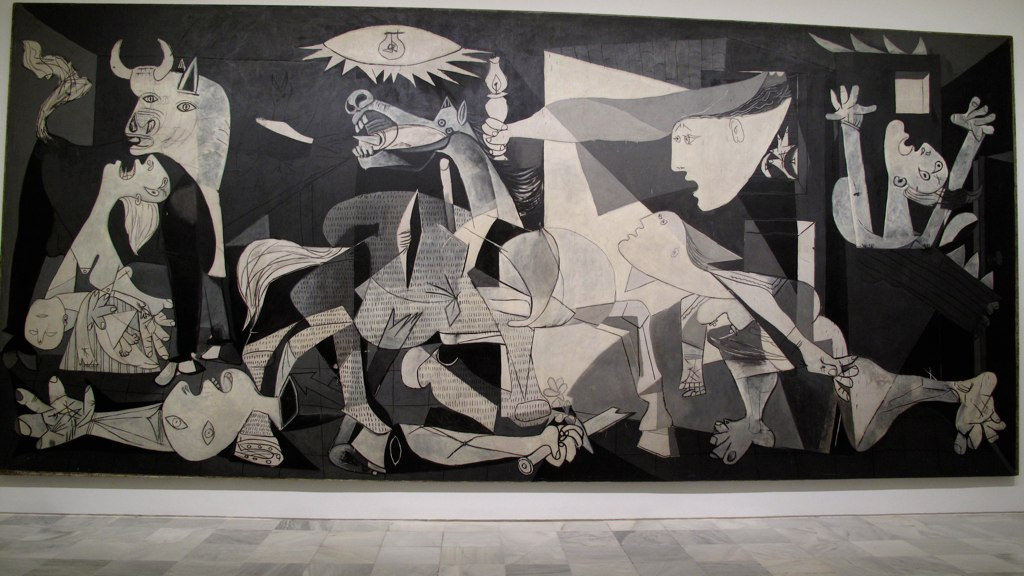 Where is the modern-day Guernica? / Image: public domain
Where is the modern-day Guernica? / Image: public domain
Does this mean that the cause of art is irrevocably lost? To draw such a conclusion would be to fall into the kind of pessimism and artistic nihilism that undoubtedly is the most general mood that exists today in the ranks of the bourgeoisie and its middle-class camp followers. But Marxism is optimistic and revolutionary by its very nature. Far from being pessimistic about the perspectives for art and culture in general, we are very confident in the role it can play both today and in the future.
Marxists by no means reject the great achievements made by art and culture in the course of the last 2000 years of human civilisation. But we understand that for all of this time the road to culture was blocked for the great majority of men and women. For all this time art and culture have been the monopoly of the privileged few, the same privileged few that enjoyed the benefit of wealth and education, and consequently controlled the government and destiny of the people.
All history shows that art is revolutionary by its very nature. Beneath the surface, great art always seeks to break with stale convention and find new ways of looking at the world. Art is involved in a never-ending quest for the truth. For that reason, it is hostile to all forms of hypocrisy, lies and deception. Modern art is bound to clash with the system if it sincerely wishes to break out of its impasse in which it finds itself.
The present social and political ferment in Iran will inevitably inspire a whole new generation of poets, writers and dramatists whose works will reflect the events in society. Now more than ever is it impossible for Iranians writers to isolate themselves from social reality. The new generation will find ways and means to express the feelings, thoughts and aspirations of the masses. In so doing, they will return to the rich artistic and literary traditions of the past, breathing into them the breath of new life.
Dialectics tells us that sooner or later everything turns into its opposite. History in general can sometimes appear to be never-ending cycle in which events that have been seen in the past are repeated. There is an element of truth in this observation, but it is incomplete and therefore false. The wheel of history is constantly turning. But in all its revolutions, it never returns to its starting point. History is repeated, but it always ends on a qualitatively higher level, enriched by all the accumulated contents of the past.
These observations are applicable not only to the development of societies but of art and culture also. In the past Persia experienced periods of great artistic attainments, followed by periods of decline and even barbarism. But the colossal potential of the people of Iran and its artists, writers and intellectuals, remains intact. In the future this potential will enable Iran to rise to heights of cultural achievements that will place all the glories of the past in the deepest shade. Today more than ever the true artist will seek to unite his or her personal creative strivings with the strivings of the mass of the exploited and oppressed people to change society and create a better world. There can surely be no higher art form than that.
London, 4 April 2018

